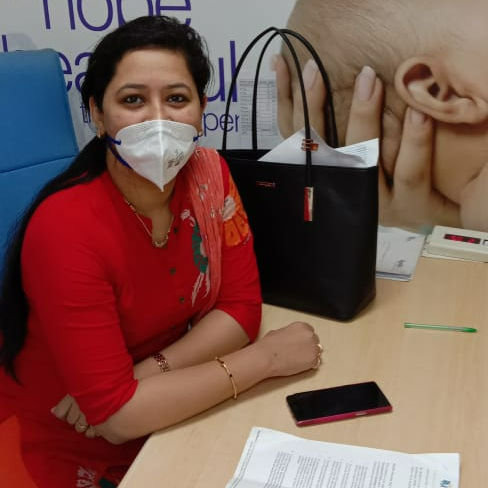You Must Know Your Menstrual Date: A Health Guide
Know your menstrual date, why to track, understand the menstrual cycle, track your cycle and decoding the menstrual cycle and more.

Written by Dr. Vasanthasree Nair
Reviewed by Dr. Dhankecha Mayank Dineshbhai MBBS
Last updated on 13th Jan, 2026

Introduction
For decades, tracking a menstrual cycle was often relegated to a small circled date on a calendar, a private note for predicting the next period. But in today's world of health awareness, knowing your menstrual date is so much more. It's a powerful, non-negotiable tool for understanding your body, optimising your health, and even uncovering potential underlying conditions. Your cycle is a vital sign, much like your blood pressure or heart rate, offering a monthly report card on your overall well-being. This article will demystify your cycle, explain why tracking it is crucial, and show you how to move beyond just the period date to become the expert on your own body.
Why Tracking Your Menstrual Cycle is Non-Negotiable
Your menstrual cycle is far more than just your period. It's a complex, orchestrated dance of hormones that influences everything from your energy levels and mood to your brain function and metabolism. By tracking it, you move from being a passive passenger to an active pilot of your health.
- Predictability and Preparedness: The most immediate benefit is avoiding surprises. Knowing when to expect your period allows you to plan life events, vacations, and important meetings with confidence.
- Identifying Your Fertile Window: For those trying to conceive or avoid pregnancy, tracking is essential. It helps pinpoint ovulation and the fertile window, which is critical for family planning. Understanding ovulation and fertility is a key reason many start tracking.
- Uncovering Health Patterns: Many women experience cyclical symptoms like migraines, acne flare-ups, mood swings, and bloating. Tracking helps you connect these symptoms to specific phases of your cycle, allowing you to anticipate and manage them proactively.
- Early Detection of Health Issues: A suddenly irregular cycle, extremely heavy bleeding, or severe pain can be red flags for conditions like Polycystic Ovary Syndrome (PCOS), endometriosis, or thyroid disorders. Consistent tracking provides your doctor with invaluable data for diagnosis.
Consult a Gynaecologist for Personalised Advice
Understanding Your Cycle: More Than Just a "Date"
To truly know your cycle, you need to understand its phases. The average cycle is 28 days, but a range of 21 to 35 days is considered normal. Day 1 is the first day of full menstrual flow.
The Four Phases of Your Menstrual Cycle
The cycle is governed by the intricate interplay of estrogen and progesterone, creating four distinct phases.
Menstrual Phase (Days 1-5)
This phase begins with the shedding of the uterine lining. Estrogen and progesterone are at their lowest, which can cause lower energy levels. This is the phase most commonly associated with the menstrual date.
Follicular Phase (Days 1-13)
Overlapping with the menstrual phase, this phase starts on Day 1 and ends at ovulation. The pituitary gland releases Follicle-Stimulating Hormone (FSH), stimulating the ovaries to produce follicles. One follicle becomes dominant and produces estrogen, which thickens the uterine lining again.
Ovulatory Phase (Day 14)
A surge in Luteinizing Hormone (LH) causes the dominant follicle to release an egg—this is ovulation. This is the shortest phase but the most critical for fertility. Estrogen peaks right before ovulation, often boosting energy and libido.
Luteal Phase (Days 15-28)
After releasing the egg, the follicle transforms into the corpus luteum, which secretes progesterone. This hormone prepares the uterine lining for a potential pregnancy. If pregnancy doesn't occur, the corpus luteum disintegrates, progesterone and estrogen levels drop, and the cycle begins anew with menstruation.
How to Accurately Track Your Menstrual Cycle and Period?
Gone are the days of just a calendar. Today, you have multiple effective methods at your disposal.
Traditional Methods: Calendar and Journal
The simplest way is to mark the first day of your period on a physical calendar or in a notes app. Note the start date, end date, and any symptoms (e.g., cramps, mood, flow intensity). Over 3-4 months, you'll see a pattern emerge for your average cycle length.
Digital Tools: Period Tracking Apps
Apps like Flo, Clue, and Eve are incredibly popular. They do the math for you, predicting your next period, fertile window, and PMS symptoms based on the data you input. Many also offer educational content on women's reproductive health.
Symptothermal Method: Tracking Fertility Signs
For a highly accurate picture, especially for fertility awareness, you can track:
- Basal Body Temperature (BBT): Your resting temperature slightly rises after ovulation and stays elevated until your next period.
- Cervical Mucus: Its consistency changes throughout the cycle, becoming clear, slippery, and stretchy (like egg whites) around ovulation to facilitate sperm travel.
Decoding What Your Cycle is Telling You About Your Health
Your cycle's patterns are a direct line to your health. Here’s what to watch for.
What is a "Normal" vs. "Irregular" Cycle?
A regular menstrual cycle is consistent in length for you, even if it's 35 days long. Irregularity means significant variation in cycle length (e.g., a 24-day cycle followed by a 40-day cycle), missing periods (amenorrhea), or extremely heavy or painful bleeding.
Common Causes of Irregular Periods
Common causes of irregular periods include:
- Stress: High cortisol levels can disrupt the hormonal signals for ovulation.
- Significant Weight Fluctuation: Being significantly underweight or overweight can affect hormone production.
- PCOS: A common hormone disorder that often causes irregular cycles and anovulation.
- Thyroid Disorders: Both hyper- and hypothyroidism can impact cycle regularity.
- Perimenopause: The transition to menopause often brings irregular cycles.
When to Consult a Healthcare Professional
You must see a doctor if you experience:
- Your periods suddenly stop for 90 days or more without pregnancy.
- Your cycles are consistently less than 21 days or more than 35 days apart.
- You experience severe pain that over-the-counter medication doesn't help.
- You bleed heavily, soaking through a pad or tampon every 1-2 hours for several hours.
- You bleed between periods or after sex.
Conclusion: Empower Yourself Through Knowledge
Knowing your menstrual date and understanding the cycle it anchors is one of the most empowering acts of self-care. It transforms a biological function from a monthly inconvenience into a source of profound insight. By paying attention to this rhythm, you gain a powerful language to communicate with your body and with healthcare providers. You can advocate for yourself with data, not just anecdotes. Start tracking today, whether with a simple circle on a calendar or a sophisticated app. Embrace this knowledge, and take control of your health narrative, one cycle at a time.
Consult a Gynaecologist for Personalised Advice
Consult a Gynaecologist for Personalised Advice

Dr. Bidisha Roy Choudhury
Obstetrician and Gynaecologist
17 Years • MBBS , DNB(Obstetrics & Gynaecology)
Bansdroni
Siddhita Healthcare., Bansdroni

Dr. Sanjan Das
Obstetrician and Gynaecologist
15 Years • MBBS,MS
Bengaluru
Apollo Clinic, Sarjapur Road, Bengaluru

Dr. Sangeetha M
Obstetrician and Gynaecologist
21 Years • MBBS, MS ( Obstetrics & Gynaecology )
Bansdroni
Siddhita Healthcare., Bansdroni

Dr. Humeena Taj C K
Obstetrician and Gynaecologist
11 Years • MBBS, DGO, DNB OBG
Bengaluru
Apollo Medical Center, Marathahalli, Bengaluru

Dr. Parul Sharma
Obstetrician and Gynaecologist
8 Years • MBBS, MS (Obstetrics & Gynaecology)
New Delhi
THE DOCTORS NESST, New Delhi
Consult a Gynaecologist for Personalised Advice

Dr. Bidisha Roy Choudhury
Obstetrician and Gynaecologist
17 Years • MBBS , DNB(Obstetrics & Gynaecology)
Bansdroni
Siddhita Healthcare., Bansdroni

Dr. Sanjan Das
Obstetrician and Gynaecologist
15 Years • MBBS,MS
Bengaluru
Apollo Clinic, Sarjapur Road, Bengaluru

Dr. Sangeetha M
Obstetrician and Gynaecologist
21 Years • MBBS, MS ( Obstetrics & Gynaecology )
Bansdroni
Siddhita Healthcare., Bansdroni

Dr. Humeena Taj C K
Obstetrician and Gynaecologist
11 Years • MBBS, DGO, DNB OBG
Bengaluru
Apollo Medical Center, Marathahalli, Bengaluru

Dr. Parul Sharma
Obstetrician and Gynaecologist
8 Years • MBBS, MS (Obstetrics & Gynaecology)
New Delhi
THE DOCTORS NESST, New Delhi
More articles from Menstrual Disorder
Frequently Asked Questions
How many days after my period do I ovulate?
Ovulation typically occurs about 14 days before your next period, not after your last one. So, if you have a 28-day cycle, you likely ovulate around day 14. If you have a 35-day cycle, you likely ovulate around day 21.
Can I get pregnant on my period?
While less likely, it is possible. Sperm can live inside the female reproductive tract for up to 5 days. If you have a short cycle and ovulate soon after your period ends, having sex near the end of your period could lead to pregnancy.
What is considered a 'heavy' period?
Medically, menorrhagia (heavy bleeding) is defined as losing more than 80ml of blood per cycle. A more practical sign is needing to change your pad or tampon every 1-2 hours for several consecutive hours or passing blood clots larger than a quarter.
Why did my period come early this month?
An occasional early period is usually nothing to worry about. Common causes include high stress, minor illness, sudden weight change, or even travel. If it becomes a persistent pattern, it's worth discussing with a doctor.
Is it normal to have irregular periods in your early teens?
Yes, it can take several months or even a few years after menarche (a first period) for cycles to become regular as the hormonal system matures. However, if periods are extremely painful, very heavy, or absent for more than 3 months, a doctor's visit is recommended.

